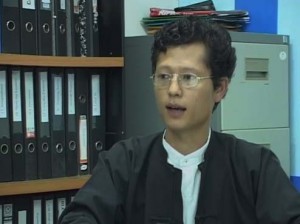Burma: Come Home But Be Quiet
By Burma Partnership • September 3, 2012 On Thursday, the office of President Thein Sein released the names of some 2,000 people who were removed from Burma’s infamous blacklist. For most of the people who discovered their names on the list it must have been an unprecedented moment, coming home was finally conceivable after years in exile. Yet looking at it more closely it appears that Thein Sein’s invitation to come home is also an invitation to remain quiet.
On Thursday, the office of President Thein Sein released the names of some 2,000 people who were removed from Burma’s infamous blacklist. For most of the people who discovered their names on the list it must have been an unprecedented moment, coming home was finally conceivable after years in exile. Yet looking at it more closely it appears that Thein Sein’s invitation to come home is also an invitation to remain quiet.
Little was said in the news about the more than 4,000 names remaining on the blacklist. Who are they? Why are they still on the list? When will they be removed? The only person who does know is President Thein Sein, thus ensuring that he still has the discretionary power to select who is and who is not allowed back home.
Welcoming exiles back to Burma and truly opening a space for free speech would mean consigning the entire concept of a blacklist to the history books. For Thein Sein’s invitation to be serious and genuine it must extend to everybody.
In March 2011, Thein Sein invited people living in exile to return to the country and take part in the reform process. This week, Kyaw Kyaw Min who accepted Thein Sein’s offer to come home, became the first former-exile to be prosecuted upon his return to Burma. He was convicted to six months imprisonment for contempt of court while representing democracy activists in 2007. His clients were arrested during a march calling for the release of Daw Aung San Suu Kyi. He was sentence in absentia in 2008 but on 28 August he was arrested and sent to Insein prison.
As his colleague and fellow lawyer Nyi Nyi Htwe said, “This simply shows that there are no assurances and guarantees for exiles on their future, safety or dignity despite [the president’s] welcoming speech… This action might put off exiled people from coming back home. I just would like to tell exiles to think about it seriously.” He is right: there are countless exiles who have been sentenced in absentia for political “crimes” under the former junta and would face years of imprisonment if the same logic was applied on their return.
If President Thein Sein is serious about welcoming activists in exile back to Burma, he must immediately end all forms of judicial harassment against human rights lawyers and activists in the country and grant an amnesty to exiles and refugees for their participation in armed conflict or political activities. Amnesty for exiles and refugees is seen as a way to guarantee their security, to fulfill their right to return peacefully without the very real risk of arrest, detention, imprisonment or legal proceedings and to guarantee their right to take part in national political processes.
President Thein Sein should grant an amnesty to exiles and refugees before their return instead of a casual and informal oral invitation; this is not enough to ensure their security. The amnesty should include crimes related to internal conflict and political “crimes” such as participation in an unlawful association, but must exclude war crimes, crimes against humanity and the crime of genocide. In this regard, all current investigations and trials must be stopped, all completed trials annulled and all political prisoners sentenced in connection with the armed conflict or for political activities released.
Activists in exile will come back eventually, but only if they are free to fight for peoples’ rights, continue to raise their voices and make vital contributions towards genuine democratic transition in the country.
Tags: Burma Partnership, Political PrisonersThis post is in: Blog
Related PostsBurma Partnership Celebrates Continuing Regional Solidarity for Burma and Embraces the Work Ahead for Progressive Voice
Burma Army Displays Blatant Disregard for 21st Century Panglong Peace Process
Ann Din Coal Power Plant: Local Movement and Action to Preserve and Protect Natural Resources and Land: Mon IDP Report Case Study #4
Latest Human Rights Abuse Case Demonstrates Urgent Need to Reform the Myanmar National Human Rights Commission
Human Rights Far From Guaranteed as US Sanctions on Burma Are Removed









 All posts
All posts